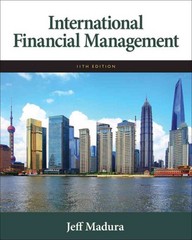


3. (Calculating free cash flows) At present, Solartech Skateboards is considering expanding its product line to include gas-powered skateboards; however, it is questionable how well they will be received by skateboarders. Although you feel there is a 40 percent chance you will sell 8,000 of these per year for 10 years after which time this project is expected to shut down because solar-powered skateboards will become more popular), you also recognize that there is a 30 percent chance that you will only sell 1,000 and also a 30 percent chance you will sell 15,000. The gas skateboards would sell for $110 each and have a variable cost of $35 each. Regardless of how many you sell, the annual fixed costs associated with production would be $120,000. In addition, there would be an initial expenditure of $900,000 associated with the purchase of new production equipment which will be depreciated using the bonus depreciation method in year 1. Because of the number of stores that will need inventory, the working capital requirements are the same regardless of the level of sales. This project will require a one-time initial investment of $40,000 in net working capital, and working-capital investment will be recovered when the project is shut down. Finally, assume that the firm's marginal tax rate is 23 percent. a. What is the initial outlay associated with the project? b. What are the annual free cash flows associated with the project for years 1, and 2 through 9 under each sales forecast? What are the expected annual free cash flows for year 1, and years 2 through 9? c. What is the terminal cash flow in year 10 (that is, what is the free cash flow in year 10 plus any additional cash flows associated with the termination of the project)? d. Using the expected free cash flows, what is the project's NPV given a required rate of return of 9 percent? What would the project's NPV be if 8,000 skateboards were sold? a. What is the initial outlay associated with this project? $ (Round to the nearest dollar.) b. If your sales forecast is 8,000 skateboards per year, what is the free cash flow associated with this project for year 1? $ (Round to the nearest dollar.) If your sales forecast is 8,000 skateboards per year, what are the free cash flows associated with this project for years 2 through 9 (note that the cash flows for years 2 through 9 are equal)? $ (Round to the nearest dollar.) If your sales forecast is 1,000 skateboards per year, what is the free cash flow associated with this project for year 1? $ (Round to the nearest dollar.) If your sales forecast is 1,000 skateboards per year, what are the free cash flows associated with this project for years 2 through 9 (note that the cash flows for years 2 through 9 are equal)? $ (Round to the nearest dollar.) If your sales forecast is 15,000 skateboards per year, what are the free cash flow associated with this project for year 1? (Round to the nearest dollar.) If your sales forecast is 15,000 skateboards per year, what are the free cash flows associated with this project for years 2 through 9 (note that the cash flows for years 2 through 9 are equal)? (Round to the nearest dollar.) What is the expected free cash flow for year 1? $ $ (Round to the nearest dollar.) What are the expected free cash flows for years 2 through 9 (note that the cash flows for years 2 through 9 are equal)? $ (Round to the nearest dollar.) c. If your sales forecast is 8,000 skateboards per year, what is the terminal cash flow in year 10 (that is, what is the free cash flow in year 10 plus any additional cash flows associated with the termination of the project)? $ (Round to the nearest dollar.) If your sales forecast is 1,000 skateboards per year, what is the terminal cash flow in year 10 (that is, what is the free cash flow in year 10 plus any additional cash flows associated with the termination of the project)? $ (Round to the nearest dollar.) If your sales forecast is 15,000 skateboards per year, what is the terminal cash flow in year 10 (that is, what is the free cash flow in year 10 plus any additional cash flows associated with the termination of the project)? (Round to the nearest dollar.) What is the expected terminal cash flow in year 10? (Round to the nearest dollar.) d. Using the expected free cash flows, what is the project's NPV given a required rate of return of 9 percent? $ (Round to the nearest dollar.) What would the project's NPV be if they sold 8,000 skateboards? $ (Round to the nearest dollar.)









